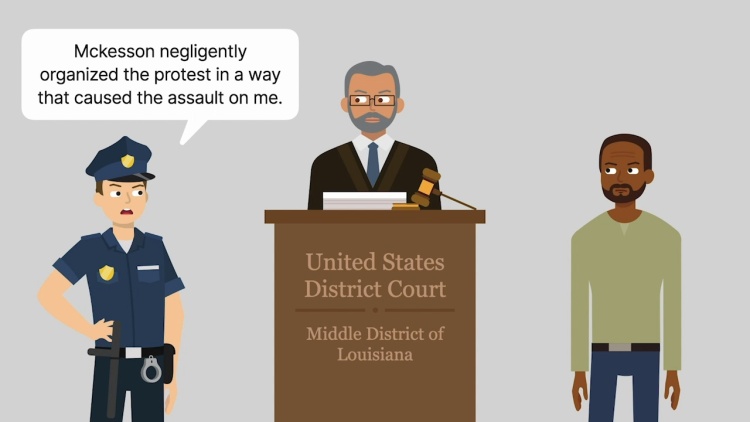Mckesson v. Doe
United States Supreme Court
141 S. Ct. 48 (2020)

- Written by Kate Douglas, JD
Facts
DeRay Mckesson (defendant) organized a demonstration in Baton Rouge, Louisiana, to protest a local officer-involved shooting. The protesters, allegedly acting at Mckesson’s direction, blocked the highway in front of police headquarters. To clear the highway, police began arresting the protestors. An unidentified protestor threw a hard object, striking Officer Doe (Doe) (plaintiff) in the face and causing serious injuries. Doe sued Mckesson in federal district court, alleging that Mckesson negligently organized the protest in a manner that caused Doe’s assault. The district court dismissed Doe’s negligence claim on First Amendment grounds. A divided panel of the Fifth Circuit reversed. The Fifth Circuit acknowledged that under Louisiana law, which governed the case, a person generally had no duty to protect others from a third party’s criminal acts. However, the Fifth Circuit concluded that a jury could find that Mckesson breached his duty not to negligently precipitate a third party to commit a criminal act because a violent clash between police and protestors was a foreseeable consequence of directing the protestors to block the highway. The Fifth Circuit further found that the First Amendment did not preclude Doe’s claim. The United States Supreme Court granted cert.
Rule of Law
Issue
Holding and Reasoning (Per curiam)
What to do next…
Here's why 907,000 law students have relied on our case briefs:
- Written by law professors and practitioners, not other law students. 47,100 briefs, keyed to 996 casebooks. Top-notch customer support.
- The right amount of information, includes the facts, issues, rule of law, holding and reasoning, and any concurrences and dissents.
- Access in your classes, works on your mobile and tablet. Massive library of related video lessons and high quality multiple-choice questions.
- Easy to use, uniform format for every case brief. Written in plain English, not in legalese. Our briefs summarize and simplify; they don’t just repeat the court’s language.





